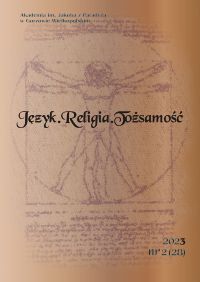Śpi jak młynarz na worku… O językowo-kulturowym obrazie snu w polszczyźnie
Sleeping like a miller on a sack.... On the linguistic-cultural image of the dream in the Polish language
Author(s): Elżbieta Skorupska-RaczyńskaSubject(s): Language studies, Language and Literature Studies, Applied Linguistics
Published by: Akademia im. Jakuba z Paradyża
Keywords: lexis; phraseology; linguistic picture of the world; culture;
Summary/Abstract: Sleep, understood as a physiological need of man, accompanies him in accordance with the daily rhythm, the incidental disruption of which is not life-threatening. The important role of sleep is evidenced by the rich vocabulary assigned to it, as well as collections of sayings that interpret or use figuratively this aspect of physiology. An analysis of dictionary resources made it possible to extract from them more than 300 lexical units (nominalisms and verbalisms) denoting sleep neutrally (e.g.: nap, half-sleep, drowsiness; sleep away, sleep in, have a good sleep) and marked, including humorously (e.g.: snore, cop some Z’s, conk off, rack, wrap yourself like a pancake) or crudely. The image of sleep from a physiological perspective is also reflected in a total of over 240 proverbs of different origins and longevity in the Polish language. They interpret both the beneficial effects of sleep (e.g.: Sleep is your best friend; Get some sleep, tomorrow will be better) as well as its negative sides (e.g.: No one has made any money by sleeping; Those who sleep for a long time suffer from poverty). The dream motif is used in literature, mainly that intended for children, as a didactic aspect.
Journal: Język. Religia. Tożsamość
- Issue Year: 28/2023
- Issue No: 2
- Page Range: 277-297
- Page Count: 21
- Language: Polish

